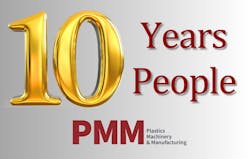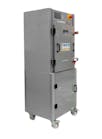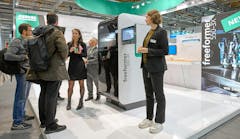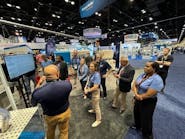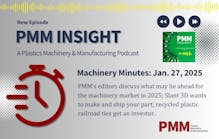Light processing technology revolutionizes 3D printing
As Plastics Machinery & Manufacturing turns 10, we're looking back at 10 people who made significant contributions to the industry during the past decade. Read more of our 10 People for 10 Years here.
By Bruce Geiselman
By using light to build parts out of molten resin, chemist Joseph DeSimone and the company he co-founded, Carbon Inc., have helped move additive manufacturing from prototyping to producing parts on a large scale.
Continuous liquid interface production (CLIP) technology — which DeSimone co-invented — offers an alternative to the slow, layer-by-layer construction technique used by many other 3D printing technologies. It allows for the printing of production-grade parts comparable in performance to injection molded parts, including parts with complex geometries that can be difficult or impossible to achieve with molding.
DeSimone co-founded Carbon in 2013 and served as its CEO for about six years before taking an appointment at Stanford University, where he is a professor in the radiology and chemical engineering departments. He had previously taught and conducted research at the University of North Carolina and North Carolina State University.
He still serves on the company’s board.
Driven by CLIP technology, Carbon’s Digital Light Synthesis (DLS), “uses digital light projection, oxygen-permeable optics, and engineering-grade materials to produce polymeric parts with exceptional mechanical properties, resolution, and surface finish,” according to the company.
Manufacturers including sporting goods manufacturers Rawlings and Riddell, athletic shoe manufacturer Adidas, automobile manufacturer Ford Motor Co., blender manufacturer Vitamix, and bicycle seat manufacturer Specialized Bicycle Components are among many companies using Carbon 3D printers in commercial production of products. Industries using the technology include the medical, dental and aerospace sectors.
Under DeSimone’s leadership, Carbon also introduced the first subscription business model for 3D printers, which helps customers ensure their equipment is always up to date.
DeSimone has published more than 380 scientific articles, holds more than 240 patents and received the National Medal of Technology and Innovation for chemistry from President Barack Obama. It is the nation's highest honor for technological achievement, awarded for outstanding contributions to U.S. economic, environmental and social well-being, according to the National Science Foundation.
Bruce Geiselman | Senior Staff Reporter
Senior Staff Reporter Bruce Geiselman covers extrusion, blow molding, additive manufacturing, automation and end markets including automotive and packaging. He also writes features, including In Other Words and Problem Solved, for Plastics Machinery & Manufacturing, Plastics Recycling and The Journal of Blow Molding. He has extensive experience in daily and magazine journalism.

